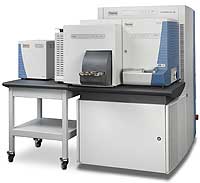Mar 11 2008
Thermo Fisher Scientific Inc., the world leader in serving science, has announced that its award-winning Thermo Scientific LTQ Orbitrap® hybrid series of mass spectrometers are now available with electron transfer dissociation (ETD) and matrix-assisted laser desorption/ionization (MALDI) capabilities. The LTQ Orbitrap XL ETD is the only ETD instrument with both high resolution and accurate mass, enabling definitive protein characterization during mass spectrometry (MS). The new MALDI LTQ Orbitrap series simplifies the analysis of whole tissue, biological and polymer samples by eliminating sample preparation. The new LTQ Orbitrap capabilities were showcased at PITTCON 2008.
 MALDI on Orbitrap
MALDI on Orbitrap
Thermo Scientific ETD technology enables highly sensitive post-translational modification analyses. Combined with the power of the LTQ Orbitrap XL, ETD completes the most advanced proteomics platform available by offering three complementary fragmentation techniques in one instrument. It can be used for definitive protein/peptide characterization, post-translational modification (PTM) analysis (especially phosphorylation) and top-down or middle-down sequencing of proteins and peptides.
“Introduction of ETD on an LTQ Orbitrap is a landmark event in the field of proteomics,” said renowned proteomics researcher Steven P. Gygi, PhD. “ETD is what is next for mainstream and cutting-edge proteomics applications. Its usefulness is so broad that I can't imagine a research or core mass spectrometry lab without this new system in the future.”
The new MALDI source, available on the LTQ Orbitrap XL and Discovery, is ideally suited for proteomic and metabolism applications. For the first time, resolutions of greater than 50,000 FWHM and mass accuracies of 1-2 ppm are routinely available for MS, MS/MS and even MSn data. Using the high-resolving power and outstanding mass accuracy of the LTQ Orbitrap, researchers can now perform peptide and protein identification of MALDI-produced ions. Other important applications include the high-throughput analysis of in-gel digests of 2D gel spots, de novo sequencing, iTRAQ™ quantitation, tissue imaging and small molecule analysis.
“The addition of these two key capabilities to the premier Thermo Scientific Orbitrap technology platform is a significant advancement for the world of proteomics and metabolomics,” said Dr. Ian Jardine, vice president of global research and development for Thermo Fisher Scientific. “Thermo Fisher is dedicated to developing innovations for its customers that embrace the most sophisticated analytical technologies available for their applications. This is clearly demonstrated with the introduction of the most comprehensive proteomics platform available on the market.”